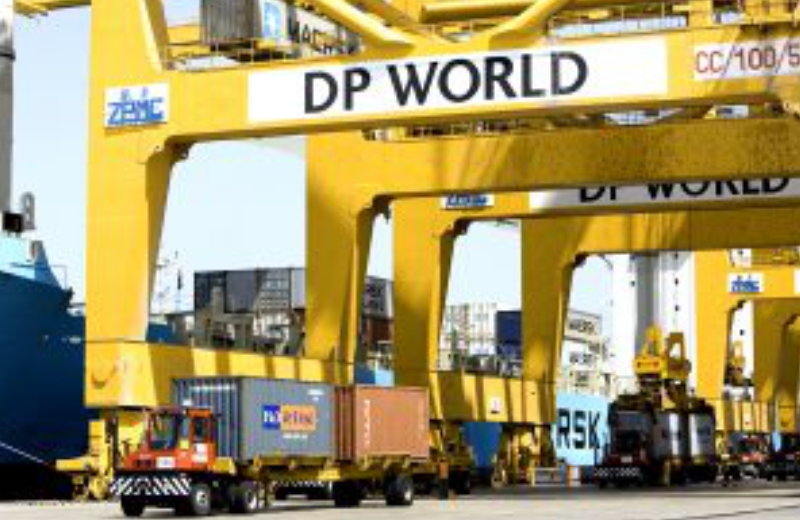August 26, 2020: DP World’s move to buy three key units of Transworld Group will change the dynamics of India’s container logistics market, leaving its strongest local rival, Adani Ports and Special Economic Zone, scrambling for a counter strategy to neutralise the impact.
Five of the six container terminals run by D P World in India are at Central Government-owned major ports, operating under regulated rate regimes, while Adani’s container facilities are mostly in private ports operated by the firm. Its only facility at a Central Government port, Kamarajar Port near Chennai, is free from rate regulation because it is a corporate port unlike the port trusts where rates are governed by the Tariff Authority for Major Ports (TAMP).
The deal with Transworld, announced on Wednesday, is an indication of the shifting strategy of D P World globally to turn into an integrated logistics solutions provider, from a pure play terminal operator, as well as its attempts to take the game away from Adani Ports in India.
Container feedering
Container feedering is at the heart of this strategy and a feeder operator with a sizeable volume as Transworld, with 1.2 million twenty-foot equivalent units (TEUs) a year, is a prized catch in this pursuit.
Days ahead of the deal, the volume game started to play out when Transworld, through its Indian listed unit Shreyas Shipping & Logistics, moved its services calling at Krishnapatnam and Kattupali ports run by Adani Ports, to D P World’s facility in Chennai Port Trust, helping the terminal operator, owned by the Dubai government, to shore up desperately needed volumes in the midst of a demand contraction induced by the pandemic.
Feeder vessel operators carry containers of all mainline container ship operators such as Maersk, MSC and CMA CGM. This is because the mainline operators don’t deploy their own vessels for short sea/ feeder services due to lack of adequate container cargo to fill up their big vessels.
This gains an added dimension in the Indian context as about 25 per cent of the country’s annual container volumes are transhipped through neighbouring or regional hubs such as Colombo, Singapore and Jebel Ali in Dubai.
Hence, mainline operators have to depend on feeders, making them a vital part of ocean logistics.
Due to intense competition among feeder operators serving the Indian trade, D P World will use the Transworld Feeders and Avana Logistek brand in tandem with its Unifeeder Indian Sub-Continent (Unifeeder ISC) platform to wean away customers by offering feedering services to deliver containers at Colombo and Jebel Ali, thereby ramping up volumes at its terminals in Chennai, Cochin and Visakhapatnam.
This is expected to force the feeder business of Maersk, MSC, CMA CGM and Evergreen to move out of other feeder operators and patronise the Unifeeder-Transworld platform.
The D P World-Transworld deal, thus, will change the dynamics of the container logistics market in India, severely hurting the standalone container terminals operating on the eastern coast, some of which have been “shaken up” by the deal announcement on Wednesday.
With Unifeeder, Feedertech, Perma and Transworld Feeders coming under the fold of D P World, getting feeder operators to support its main ports in India could pose a problem for Adani Ports, particularly at a time when it is adding more ports to its network.
Despite D P World’s assertion that Unifeeder will continue to operate as an independent common-user platform, feeder vessel operators say that terminal operators getting into feedering business is a “dangerous trend”.
To buttress this point, they said feeder operators, particularly the non-vessel owning common carriers (NVOCCs), are “instructed” by their owners (terminal operators) to support or use vessels calling at their terminals to promote business. This has already happened in India, with Transworld shifting from Krishnapatnam and Kattupalli ports to D P World’s Chennai terminal.
Adani Ports could thus come under pressure to make an entry into the feedering business to “take away” the transhipment containers, which are now going to D P World’s Vallarpadam terminal, when it opens the Vizhinjam terminal or to link its own network of Indian ports. Else, Adani Ports will have to go for a tie-up with other feeder operators only to support their feedering requirements.
The only choice for Adani Ports in this regard would be a Singapore-based feeder operator, which gets much of its business from India, but whose relationship with D P World is “not good”. Hence, this feeder operator calls at the Abu Dhabi terminal and not the much sought-after Jebel Ali terminal run by D P World.
The final leg of this game is the privatisation of rail hauler Container Corporation of India (CONCOR). Both D P World and Adani are expected to go all out to acquire this “hot asset” from the government. Whoever succeeds in buying CONCOR will hold sway over the container logistics market in India.
Source: The Hindu Business Line






